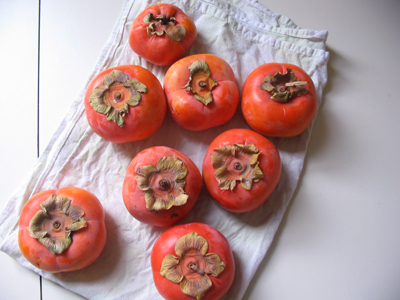
Last night I watched this documentary on PBS about the Karuk tribe of California. They live along the Klamath River. The logging companies and the federal government’s fire suppression policies have almost destroyed the Karuk. The Karuk cannot gather their medicinal plants, make their traditional foods, practice their ceremonies, etc. like they used to, because the landscape, their home, has been altered so much. Fire suppression and the planting of fir trees has almost wiped out many of the native plants in the area. This also affects the river water (fir trees drain the water) and thus affects salmon and other river flora and fauna.
The Karuk believe that the earth provides everything we need. Watching this documentary, I recognized a lot of similarities between the Karuk’s values and those of the Slow Food movement. There is an understanding that ecology and culture are inextricable, and that the only way to maintain cultures is to respectfully and correctly manage the environment. This is also the only way the earth will continue to provide for us. This kind of value system is not an economic one, but a subsistence one.
Now when we’re in this big economic crisis, I think these values are vital for us to ponder. When we don’t trust that the earth and our community will provide for us all, we become greedy and we try to figure out ways to produce/extract as much stuff as possible at any cost. {As an example, industrial agriculture plants monocultures of crops, because in the short term that is the easiest way to produce a lot of food. This ruins the soil fertility however, which will not only make the land unproductive, but also endangers surrounding communities because the soil won’t absorb water. Thus when there is a flood, it is far more devastating. There are tons of examples how overuse like this not only leads to depletion of resources and the obliteration of biodiversity but also makes us much more susceptible to flood, fire, hurricane damage.}
In the book Plenty, the co-author imagines what the part of Canada he lives in looked like before Columbus. The abundance of animal and plantlife described struck me. Our earth has become and is fast becoming less and less abundant because of our incorrect management of the environment, our shortsighted overuse/exploitation of resources and our blindness (or willfull ignoring of) how we are connected to all creatures and plants. In the focus on profit, we (industrial societies) are killing cultures, we are killing plant and animal species, we are endangering lives by making communities more vulnerable to natural disasters, we are polluting water. The list goes on and on.
I worry that in hard economic times, people will look to the short-term solutions that (the agriculture, oil, etc.) industries offer, instead of re-evaluating our capitalist value system. But I hope having a visionary leader (in America) who seems to want us to fight for community and for what is right, might inspire us to work towards just and respectful ways of living on and sustaining this earth and the earth's abundance.
Cross-posted on Mecozy.
